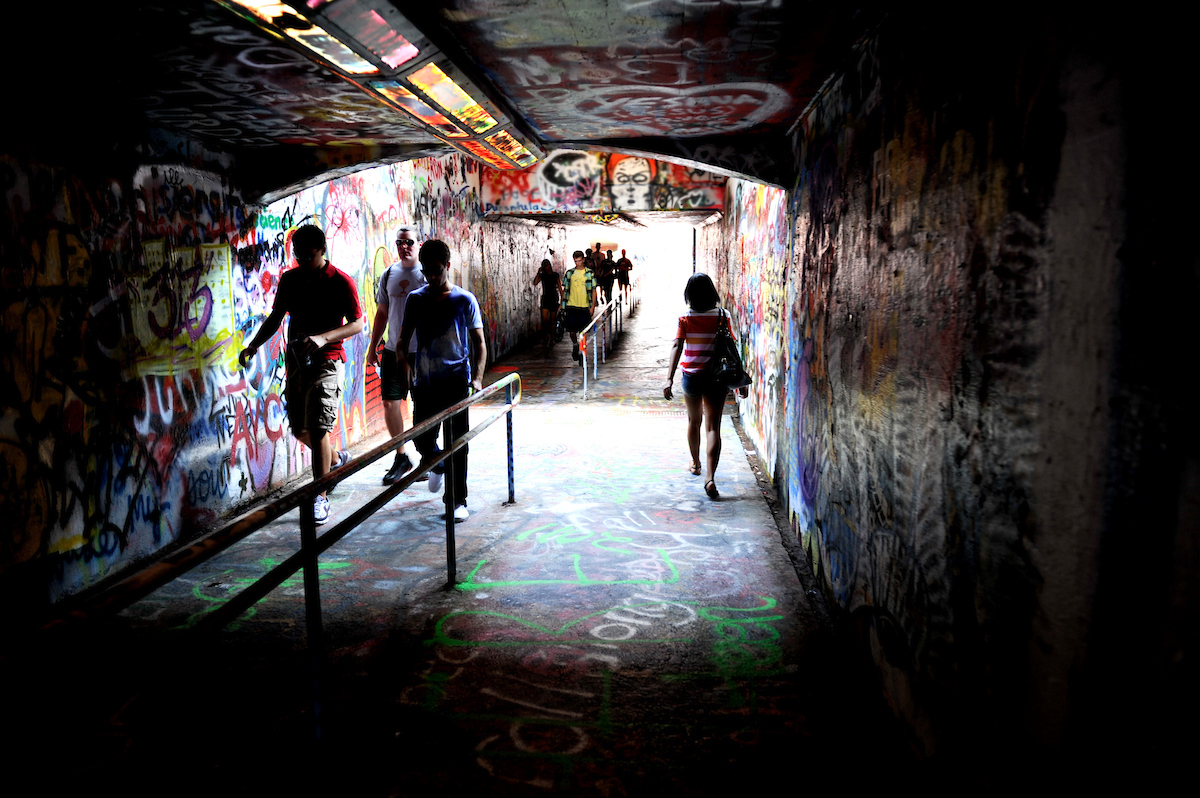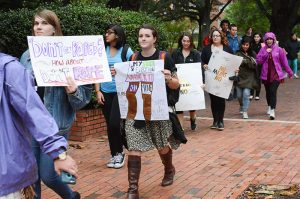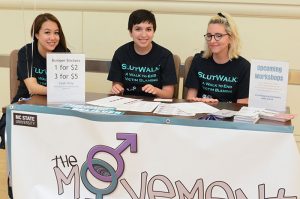Women’s Center’s Slutwalk Event Garners Support and Attendees

 On October 1, 2015, approximately 250 NC State students united to protest victim-blaming and slut-shaming at the university’s first-ever large-scale SlutWalk. SlutWalk: A Walk to End Victim Blaming was organized by The Movement Peer Educators, a student organization composed of trained peer educators who facilitate workshops on issues of gender equity and social justice. The event was supported by other groups on campus such as the GLBT Center, Students Advocating for Gender Equity and P.L.E.A.S.E., who staffed tables before and after the walk.
On October 1, 2015, approximately 250 NC State students united to protest victim-blaming and slut-shaming at the university’s first-ever large-scale SlutWalk. SlutWalk: A Walk to End Victim Blaming was organized by The Movement Peer Educators, a student organization composed of trained peer educators who facilitate workshops on issues of gender equity and social justice. The event was supported by other groups on campus such as the GLBT Center, Students Advocating for Gender Equity and P.L.E.A.S.E., who staffed tables before and after the walk.
 Attendees listened to spoken word, poetry and monologues which discussed the way that victim-blaming and slut-shaming affect various groups of students on campus. Performances highlighted, in particular, how victim-blaming may affect students who are part of the LGBT community, people of color and survivors of sexual violence. The students then marched around campus with charged emotions, with chants such as, “Whatever we wear, wherever we go, yes means yes and no means no.”
Attendees listened to spoken word, poetry and monologues which discussed the way that victim-blaming and slut-shaming affect various groups of students on campus. Performances highlighted, in particular, how victim-blaming may affect students who are part of the LGBT community, people of color and survivors of sexual violence. The students then marched around campus with charged emotions, with chants such as, “Whatever we wear, wherever we go, yes means yes and no means no.”
SlutWalk is part of a global movement that originated in Toronto, Canada in 2011. The event began as a small, grassroots march that was a direct response to a Toronto Police Officer perpetuating rape myths by claiming “women should avoid dressing like sluts in order not to be victimized.” Today this movement is still going strong, happening in over 200 countries worldwide; each individual march has the goal of highlighting victim-blaming and supporting survivors of sexual violence. Our walk aimed to draw attention to the casual usage of words like ‘slut,’ which are commonly used to blame survivors of sexual violence for their abuse. We also sought to create an environment on our campus that is supportive of all survivors of sexual violence. Therefore, we were purposeful in creating an event that was intersectional and highlighted ways in which victim-blaming affects the diverse group of students represented at NC State.
 The name itself is extremely controversial; however, the issue the event is aimed at fighting is even more important. Words like ‘slut’ are commonly used to categorize survivors of sexual violence and defend offenders. Sadly, many survivors of interpersonal violence (both relationship and sexual) face shame and blame for the abuse that they experience.
The name itself is extremely controversial; however, the issue the event is aimed at fighting is even more important. Words like ‘slut’ are commonly used to categorize survivors of sexual violence and defend offenders. Sadly, many survivors of interpersonal violence (both relationship and sexual) face shame and blame for the abuse that they experience.
To me, this means simply that students are ready and willing to engage in important conversations about sexual violence, victim-blaming and slut-shaming. Even more importantly, that students are actively looking for these kinds of meaningful events to engage in. We were completely blown away by the support that we received from not only our campus, but from the community as well. Numerous sexual violence survivors reached out and thanked us for having an event like this, students from other universities asked us if they could attend and even community members committed to going without being associated with NC State. I was pleased to see so many people attend the event wearing rain boots and jackets, dedicated to the cause even with our recent soggy weather. The level of interest and support confirmed that this conversation is something that is necessary to be had and counterproductive to ignore. Since the event, we have had nothing but positive feedback and students who are excited about the possibility of SlutWalk happening again next year.
Sara Forcella is rape prevention education coordinator in the NC State Women’s Center.
- Categories:


